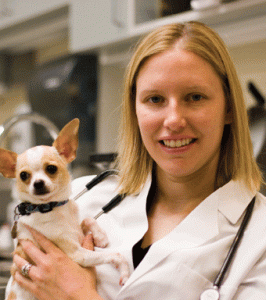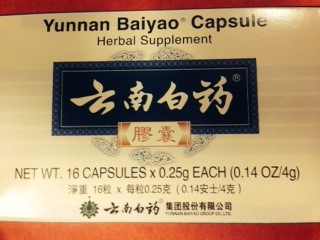-
Adopt
-
Veterinary Care
Services
Client Information
- What to Expect – Angell Boston
- Client Rights and Responsibilities
- Payments / Financial Assistance
- Pharmacy
- Client Policies
- Our Doctors
- Grief Support / Counseling
- Directions and Parking
- Helpful “How-to” Pet Care
Online Payments
Referrals
- Referral Forms/Contact
- Direct Connect
- Referring Veterinarian Portal
- Clinical Articles
- Partners in Care Newsletter
CE, Internships & Alumni Info
CE Seminar Schedule
Emergency: Boston
Emergency: Waltham
Poison Control Hotline
-
Programs & Resources
- Careers
-
Donate Now
 Megan Whelan, DVM, DACVECC, CVA
Megan Whelan, DVM, DACVECC, CVA
www.angell.org/emergency
emergency@angell.org
617-522-7282
Historically, Yunnan Baiyao has been used in people for over 114 years. Initially, it was used to curtail bleeding from combat injuries. More recently, in the human medical literature, its oral use has been to decrease the preoperative need for blood transfusions, and for ulcerative gastrointestinal disease. 2 There is very little written in the veterinary literature regarding its use. Most of the research has been conducted in dogs, rats, rabbits, and horses. However, the supplement has been used in cats.
We have been using the herb Yunnan Baiyao topically and orally for many years at Angell Animal Medical Center. It has been used as an adjunct to prevent bleeding in cases, such as pets with hemoabdomens, pericardial effusions, and epistaxis.
Formulations typically come in capsule form, 0.25 grams in each capsule, or as a powder in a 4-gram bottle. I have used the powder form and placed the powder in gel capsules for administration to a cat with a confirmed splenic hemangiosarcoma.
Typical dosing is 1 capsule (0.25 grams) per 20 lbs orally twice or three times a day.
The ingredients listed on the manufacturer’s label in 2011 included: Tienchi ginseng root, Ajuga forrestii Diels plant, Chinese yam root, Dioscoreae nipponica Makino root, Erodium stephanianum and Geranium wilfordii plant, Dioscoreae parvilora ting root, Inula cappa plant.1
The actual mechanisms by which Yunnan Baiyao affects the coagulation system have not been fully elucidated. It has been suggested that enhanced expression of surface glycoproteins on platelets plays a role. 3 Yunnan Baiyao is best known for these aforementioned hemostatic properties. However, this herbal supplement has been used for its anti-inflammatory and anti-cancer effects. A study in 2014 was performed by Wirth et al., In Vitro effects of Yunnan Baiyao on canine hemangiosarcoma cell lines after treatment with increasing concentrations of Yunnan Baiyao. The conclusion was that this herbal supplement did cause dose and time dependent hemangiosarcoma cell death through initiation of caspase-mediated apoptosis.
A more recent article, by Egger et al., The effect of Yunnan Baiyao on platelet activation, buccal mucosal bleeding time, prothrombin time, activated partial thromboplastin time, and thromboelastography in healthy dogs: a prospective, randomized, controlled, blinded, crossover study, showed non-significant differences in many clotting parameters, concluded that there was no induction of hypercoagulability. There are some limitations of the study which include that there were only 8 dogs, and they were healthy, not clinically bleeding dogs. The coagulation system in a sick pet is very different than in a healthy one. The dose used was 4 times higher than the dose that we typically use in a sick pet. There were no adverse effects noted in any dogs.
Murphy’s et al. article investigated the Use of Yunnan Baiyao and epsilon aminocaproic acid in dogs with right atrial masses and pericardial effusion. This was a retrospective, case-controlled study. Cases were obtained from two private practices, and 67 dogs were enrolled. There were no side effects attributed to the use of Yunnan Baiyao. The study did not show a significant improvement in survival time from the study dogs compared to the control dogs.
Despite the controversy of the potential benefits of this herbal supplement, whether you use the herbal supplement likely will be dependent on case and owner selection. In addition, it currently appears safe since there have been no reported adverse effects.
For more information, please contact Dr. Whelan at emergency@angell.org or call 617-522-7282.
References:
- Wirth et al. In vitro effects of Yunnan Baiyao on canine hemangiosarcoma lines. Vet Comp Oncol 14(3): 281-294, 2014.
- Egger et al. The effect of Yunnan Baiyao on platelet activation, buccal mucosal bleeding time, prothrombin time, activated partial thromboplastin time, and thromboelastography in healthy dogs: a randomized, controlled, blinded study. AJTCVM 11(2): 27-36, 2016.
- Murphy et al. Use of Yunnan Baiyao and epsilon aminocarproic acid in dogs with right atrial masses and pericardial effusion. J Vet Emerg Crit Care 1-6, 2016.

